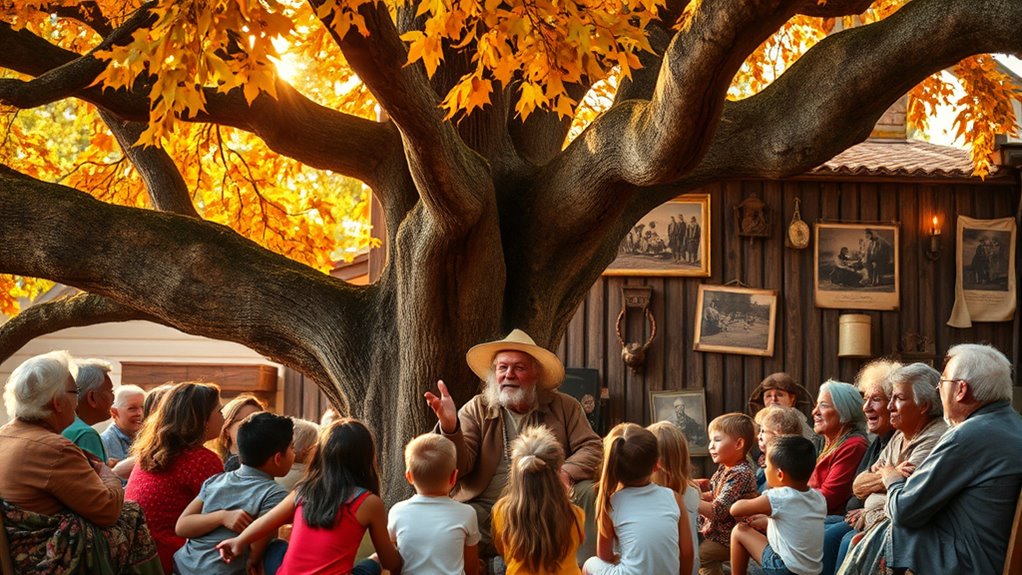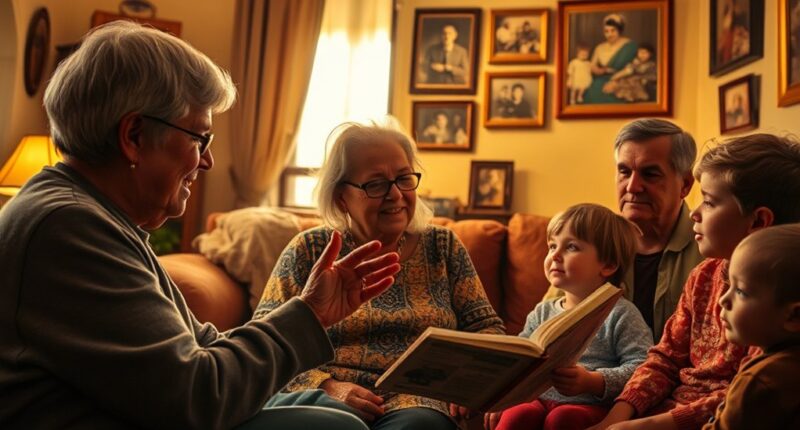Storytelling plays a vital role in shaping cultural memory across generations by passing down stories, myths, and histories that embody community values and shared experiences. When you listen or share stories, you connect with your ancestors and help preserve traditions, making culture adaptable yet resilient. These stories foster a sense of belonging and identity, keeping cultural heritage alive and relevant over time. To discover how this process continues to evolve, keep exploring the powerful influence of storytelling.
Key Takeaways
- Storytelling transmits shared histories, values, and morals, ensuring cultural memory is passed down across generations.
- Oral traditions adapt over time, keeping stories relevant and reinforcing community identity.
- Narratives humanize history, fostering empathy and strengthening bonds within the community.
- Stories serve as a flexible vessel for cultural knowledge, allowing communities to interpret and reframe their past.
- Continuous storytelling preserves cultural heritage, making it resilient against external influences and time.

Storytelling plays a vital role in shaping and preserving cultural memory, serving as a bridge between the past and the present. When you engage in oral traditions, you actively participate in passing down stories, myths, and histories that form the foundation of your community’s identity. These stories aren’t just entertainment; they carry the values, morals, and shared experiences that define who you are as a people. Through oral traditions, your ancestors have transmitted their knowledge across generations, guaranteeing that cultural memory remains alive and vibrant. As you listen and retell these stories, you reinforce a sense of belonging and continuity that binds your community together.
Engaging in oral traditions preserves cultural memory, strengthening community bonds and passing down shared values across generations.
Your collective identity is deeply embedded in the stories you tell and hear. Each narrative reflects the history, struggles, triumphs, and aspirations of your people. When you share stories about your origins or significant events, you contribute to a collective understanding of your history. This shared knowledge helps create a sense of unity and purpose, reminding everyone of the values that sustain your community. The oral transmission of these stories keeps cultural memory adaptable yet consistent, allowing you to interpret past experiences in ways that resonate with current realities. This process guarantees that your cultural identity remains dynamic, enriching your community’s sense of self across generations.
By participating in storytelling, you also play an essential role in safeguarding cultural memory from the distortions of time and external influences. Oral traditions are fluid, often evolving with each retelling, which allows your community to adapt stories to contemporary contexts while maintaining their core meanings. This flexibility helps keep the stories relevant and engaging, especially for younger generations who might connect more easily with evolving narratives. Through this continuous cycle of storytelling, you actively contribute to the resilience of your cultural memory, keeping it rooted in history while allowing it to grow and adapt. Additionally, the use of essential oils in various traditional practices can symbolize the importance of preserving cultural rituals and healing methods passed down through generations, highlighting how tangible elements support intangible cultural heritage.
Furthermore, storytelling fosters empathy and understanding within your community. When you listen to or share stories, you gain insight into the experiences of your ancestors and fellow community members. These narratives humanize history, making it more relatable and meaningful. As you carry these stories forward, you not only preserve cultural memory but also strengthen the bonds among community members. You become a vital link in a chain that sustains your collective identity, ensuring that the stories of your past continue to inform and inspire future generations. In this way, storytelling remains an essential tool for maintaining cultural continuity and fostering a shared sense of purpose.
Frequently Asked Questions
How Does Digital Media Influence Storytelling’S Role in Cultural Memory?
Digital media transforms storytelling by making it more accessible and immediate. You can share stories through digital storytelling platforms and social media, reaching wider audiences instantly. This rapid sharing helps preserve cultural memory by allowing communities to document and celebrate their traditions, histories, and values. As a result, social media amplifies diverse voices, ensuring cultural stories stay alive across generations and adapt to evolving digital landscapes.
Can Storytelling Preserve Endangered Languages and Dialects?
Imagine stories as bridges that cross time, carrying voices of the past into future generations. You can use storytelling to fuel language revitalization and dialect preservation, giving endangered languages a voice. By sharing traditional tales, folklore, and personal narratives, you keep these languages alive, vibrant threads woven into your community’s cultural fabric. Through storytelling, you protect linguistic diversity, ensuring that these unique voices continue to resonate across generations.
What Are the Psychological Effects of Storytelling on Cultural Identity?
When you engage with storytelling, you strengthen your personal identity by connecting with shared experiences and cultural values. It also boosts your emotional resilience, helping you process emotions and foster a sense of belonging. As stories are passed down, you feel more rooted in your culture, which reinforces your understanding of who you are within a larger community. This active participation in storytelling deepens your cultural awareness and personal growth.
How Do Oral Traditions Adapt in Multicultural Societies?
You might think oral traditions struggle in multicultural societies, but they actually adapt through cultural evolution, blending stories and rituals from diverse backgrounds. By incorporating new perspectives, these traditions gain renewed ritual significance, fostering unity and understanding. This dynamic process keeps cultural memory alive across generations, allowing stories to evolve while maintaining their core meaning. Embracing this adaptability guarantees that shared heritage remains vibrant and relevant in an increasingly diverse world.
What Is the Impact of Storytelling on Intergenerational Conflict?
Storytelling influences intergenerational conflict by shaping family dynamics and addressing generational misunderstandings. When you share stories, you bridge gaps, fostering empathy and understanding between generations. However, if stories are misinterpreted or clash with new perspectives, conflicts can arise. Your active listening and willingness to share diverse narratives help resolve tension, ultimately strengthening bonds. Through storytelling, you create a space for dialogue that can heal divides and promote mutual respect across ages.
Conclusion
As you pass stories from one generation to the next, you become the thread weaving a vibrant tapestry of shared history. Your words breathe life into memories, keeping traditions alive like a flame that never flickers out. By embracing storytelling, you guarantee that cultural memory thickens and deepens, anchoring your community’s identity for years to come. Remember, your voice is the bridge that keeps the past and future connected—an unbroken chain of stories waiting to be told.










